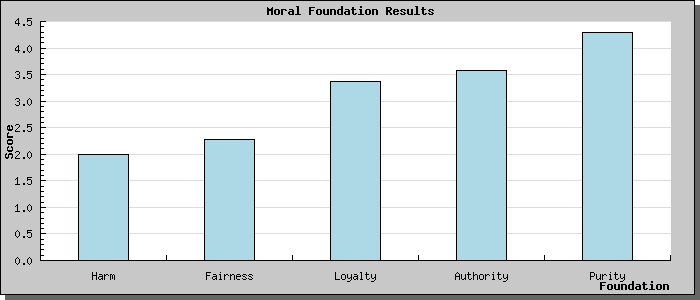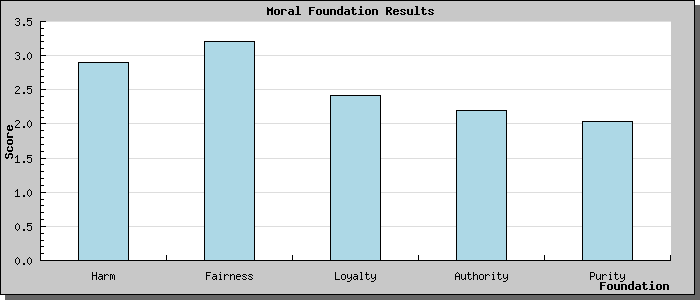Test Shows Conservatives More Complex Than Liberals
 I'm not sure that this is what Jonathan Haidt, associate professor of psychology at the University of Virginia, set out to do, but his research into the basis of our morality has shown what is obvious to most of us: Liberals run on a pretty simple clock, whereas the clockwork of conservatives is far more advanced and complex.
I'm not sure that this is what Jonathan Haidt, associate professor of psychology at the University of Virginia, set out to do, but his research into the basis of our morality has shown what is obvious to most of us: Liberals run on a pretty simple clock, whereas the clockwork of conservatives is far more advanced and complex.Did he really say that? You bet:
Haidt argues that human morality is a cultural construction built on top of - and constrained by - a small set of evolved psychological systems. He presents evidence that political liberals rely primarily on two of these systems, involving emotional sensitivities to harm and fairness. Conservatives, however, construct their moral understandings on those two systems plus three others, which involve emotional sensitivities to in-group boundaries, authority and spiritual purity. (emphasis added; source: Brightsurf)Got that? Liberals are worried that the guppy doesn't get hurt and that everyone sings Kumbaya with perfectly balanced voice quality. Conservatives are all for not harming and being fair, but create a much more complex structure for their moral measurements.
Adding in-group boundaries basically means we conservatives are conformists and are more likely to find immorality in the wanton destruction of social mores than liberals, who tend to see such destruction as a moral attribute. Rage against the machine, fight the man. Authority means, of course, respect for authority. Liberals get no moral readings from that attribute, but it's big to conservatives.
Haidt's last point is interesting: the spiritual roots of moral decisions. I think he's wrong here because his survey focuses on religion, not on beliefs. Dennis Prager correctly states that there is more dogma in the Liberal faith system (environmentalism, human rights, tolerance) than in any established religion. If Haidt had designed his survey instrument differently, I believe "core belief systems" would have scored as high with the liberals as with the conservatives, if not higher.
Haidt kindly makes it possible to take his survey. It takes about 10 minutes to complete and it's an interesting process. I'm a smidge right of right-of-center and here's how I fared:
 (Click chart for larger image)
(Click chart for larger image)Sure enough, my scores are heavily weighted to the three moral compass points on the right, the ones liberals tend not to factor in on their moral judgments: Loyalty, authority and purity.
Here by comparison, is the average of all of Haidt's responses:
 The chart does not mean there are more liberals than conservatives. It means the two liberal moral compass points are shared by conservatives, so they score quite high, whereas the conservatives overwhelmingly make up the loyalty, authority and purity team.
The chart does not mean there are more liberals than conservatives. It means the two liberal moral compass points are shared by conservatives, so they score quite high, whereas the conservatives overwhelmingly make up the loyalty, authority and purity team.You can fact-check that statement by noting that purity -- something that means next to nothing to most liberals -- is the lowest-scoring "evolved psychological system" of the five.
Harm and fairness are very simple psychological systems. If there's a bruise, it's harm and it's immoral. But a conservative wants to know whether the bruised party was with the authorities or not with them before making a judgment.
Similarly, fairness means fairness for all, which is why liberals have such a problem with Guantanamo, demanding equal judicial rights for terrorist combatants captured on the battle field. Conservatives will question whether those terrorists crossed the moral boundaries of our society, whether they're a threat to the nation (authority), and whether their motives were morally pure.
For us, the call is a no-brainer: Of course they deserve Guantanamo, or worse. And it's just as easy a call for the libs: No way do they deserve Guantanamo.
Haidt concludes,
The recent scientific advances in moral psychology can help explain why these conflicts are so passionate and so intractable. An understanding of moral psychology can also point to some new ways to bridge these divides, to appeal to hearts and minds on both sides of a conflict.I'm with him on the first part, but don't think knowledge of moral psychology will help one bit to create better understanding because we can understand where the libs are coming from as we share two of their values, but they can't understand us because they don't share three of ours.
Labels: America, Conservative, Liberals




<< Home